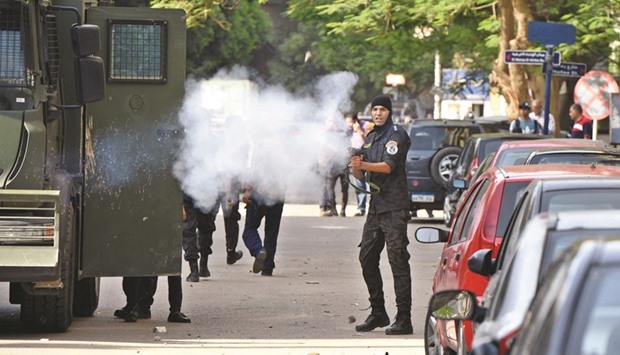Egyptian President Abdel Fattah al-Sisi’s security forces yesterday largely foiled planned protests over a controversial plan to transfer two strategic Red Sea islands to Saudi Arabia.
Police blockaded protest sites in downtown Cairo and two demonstrations that briefly got off the ground in the west of the city were quickly broken up using tear gas, local news site Mada Masr reported.
By early evening over 115 people had been arrested in the capital alone, with more taken into custody in other provinces, lawyer Ragia Omran of the Front to Defend Egypt’s Protesters said.
The Egyptian Journalists’ Syndicate said that 12 journalists were arrested and three attacked while attempting to cover the protests.
The syndicate said that government supporters accompanied by men in police uniform had attempted to storm its downtown headquarters, one of the planned rallying points for the protests.
At the headquarters of the Arab nationalist Karama Party in the western Cairo district of Dokki, activists who had escaped one of the dispersed protests sheltered alongside party officials while police blockaded the street outside.
Inside, party official Maasoum Marzouk denounced the crackdown and what he described as the siege of the party’s offices.
“We are a city under occupation now,” Marzouk said, vowing that the opposition would not allow the “sale of the islands.”
The planned handover of the islands sparked widespread anger when it was quietly announced during a recent visit to Cairo by Custodian of the Two Holy Mosques King Salman of Saudi Arabia.
More than $20bn of Saudi financing for Egyptian oil purchases was also announced during the visit, leading activists to charge that the government was “selling” Egyptian territory.
The authorities maintain that the islands of Tiran and Sanafir were always Saudi territory but were temporarily occupied by Egypt, but opposition activists and some experts have disputed that.
An initial round of protests on April 15 were among the largest non-Islamist demonstrations seen since al-Sissi was elected in 2014. Protests without police approval are effectively banned under a law passed in 2013.
The authorities had made it clear that they had no intention of permitting any further protests on the issue, with al-Sisi warning a day earlier that “forces of evil” were attempting to threaten the institutions of the state.
Security forces were deployed in large numbers in the city centre and groups who appeared to be plainclothesmen gathered at strategic junctions.
Police vehicles and ambulances were lined up around Tahrir Square, the epicentre of the 2011 popular uprising that ousted dictator Hosni Mubarak.
Pro-government demonstrators took up positions from early in the day at several locations often used by protesters, waving pictures of the president.
A coalition of 16 rights groups denounced a wave of arrests in recent days and accused prosecutors of “using trumped-up charges to harass activist and political dissidents” after those detained were accused - according to lawyers - of offences of incitement under a harsh new terrorism law.

An Egyptian riot police fires teargas during a demonstration against the handover of two islands to Saudi Arabia in Cairo yesterday.
